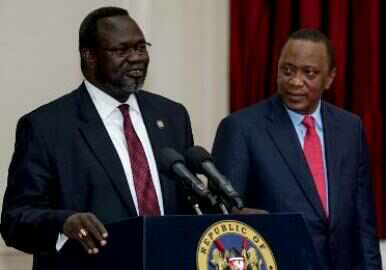Machar discusses peace process with Kenyan president
October 18, 2014 (NAIROBI) – The leader of the opposition faction of the Sudan People’s Liberation Movement (SPLM-IO), Riek Machar, has briefed Kenyan president Uhuru Kenyatta on the progress of South Sudan peace talks, as well as unresolved issues between the two warring parties.

His spokesperson James Gatdet Dak told Sudan Tribune that the talks centred mainly on issues of deadlock such as the system of governance and the leadership structure.
“Comrade Dr Riek Machar and HE President Uhuru Kenyatta had a lengthy meeting on Saturday at the State House. Our chairman briefed president Kenyatta on the progress made, as well as the deadlocks in the peace talks,” Dak said on Saturday.
The rebel leader’s spokesman further said the meeting focused on outstanding issues on system of governance, the federalism and the structure of leadership during the transition prior to elections.
He said the meeting was in accordance with the requested consultations with the leaders of the two warring factions.
Dak described the meeting between Machar and Kenyatta as cordial and understanding.
The peace talks between the Salva Kiir-led government and Machar’s rebel faction has been ongoing for more than 10 months in the Ethiopian capital, Addis Ababa, under the auspices of the Intergovernmental Authority on Development (IGAD).
IGAD last month adjourned the talks in order to consult with the principal rival leaders on issues which are contentious.
The rebel group demanded that South Sudan should be restructured based on federalism which would be implemented as part of a would-be peace agreement with the government.
Meanwhile the government agreed to federalism in principle, it expressed reluctance to implement it immediately as part of agreement suggesting a need for more consultations with the citizens.
The parties also needed to discuss the type of federalism which should apply in the new country.
The talks partly stalled due to a disagreement over the sharing of power between president and prime minister in the new government.
Machar’s group wants the prime minister, a would-be nominee from the rebel faction, to be the head of government, with the president shifted to a ceremonial role.
The government rejected the proposal, arguing that the arrangement would make the prime minister more powerful than the president.
(ST)
